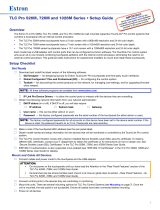
TLP Pro 300M Series • Setup Guide (Continued)
Reset Modes: a Brief Summary
The TLP Pro 300M Series touchpanels offer the following reset modes:
• Use Factory Firmware: Use this mode with Toolbelt software to replace rmware in the event of conicts arising from
uploading a rmware update.
Press and hold the Reset button (see figure 4,
C
) while applying power to the unit.
• Reset All IP Settings: Use this mode to reset all network settings without affecting user-loaded les.
Press and hold the Reset button until the Reset LED (
B
) blinks twice (about 6 seconds). Release
and momentarily press the Reset button again.
• Reset to Factory Defaults: Use this mode to return the touchpanel to factory default settings, including passwords.
Press and hold the Reset button until the Reset LED blinks three times (about 9 seconds). Release
and momentarily press the Reset button again.
NOTES:
• The factory congured passwords for all accounts on this device have been set to
the device serial number. Passwords are case sensitive.
• If the device is reset to default settings, the password will be the default password
conguration. The default password is extron.
• Enable or Disable the
DHCP Client:
Use this mode to toggle between DHCP enabled and DHCP disabled.
Press the Reset button ve times, consecutively. After the fth press, do not press the button again
within 3 seconds. If DHCP was enabled, it is now disabled and the Reset LED blinks three times. If
DHCP was disabled, it is now enabled and the Reset LED blinks six times.
Setup Menu
Figure 6 shows the Setup menu Status screen for the TLP Pro 300M.
Press the Menu button (see figure 4,
D
) to open the Setup menu. Any of the six available
screens (Status, Network, Display, Audio, Project Information, and Advanced) can be
accessed by pressing the menu button in the top left corner of the screen (for more information,
see the TLP Pro 300M Series User Guide).
It may be necessary to scroll down to see all the information on the page (for example, see the
Status screen in gure 6).
STATUS
EXIT
Device Information
Model
Part Number
Firmware
Bootloader
Network
TLP Pro 300M
60-1667-02
1.00.0001-003
1.00.0002
IP Address
192.168.254.251
Figure 6. Setup Menu: Status Screen for TLP Pro 300M
Connecting the Power Injector
The power injector must be purchased separately. Figure 5 shows the
Extron XTP PI 100. Your power injector may look different.
Connect a straight-through Ethernet cable from the power injector to a
switch or router (
1
). This cable carries network information from the
switch or router to the power supply input. A second straight-through
cable (
2
) carries the network information and 48VDC from the power
injector to the touchpanel LAN/PoE connector (see figure 4,
G
, on the
previous page). Connect the IEC power cord to a convenient 100 VAC to
240 VAC, 50-60 Hz power source (see gure 5,
3
).
100-240V
~
50-60Hz
0.4A MAX
XTP
PWR
XTP PWR
To network switchTo touchpanel
1
2
3
3
Figure 5. Connecting to a Power Injector
4
68-3146-50 Rev. A
02 20
For information on safety guidelines, regulatory compliances, EMI/EMF compatibility, accessibility, and related topics, see the
Extron Safety and Regulatory Compliance Guide on the Extron website.
For information about replacing and disposing of batteries, see the TLP Pro 300M Series User Guide at www.extron.com.
© 2020 Extron Electronics — All rights reserved. www.extron.com
All trademarks mentioned are the property of their respective owners.
Worldwide Headquarters: Extron USA West, 1025 E. Ball Road, Anaheim, CA 92805, 800.633.9876







